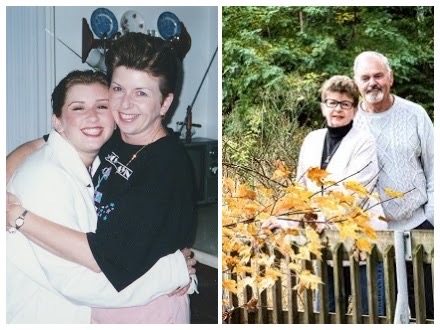
From left: Jessica and Christine; Christine and Ted Santos
Peer Grief Helper Profile: Christine Santos
By Kerry J. Bickford, VOICES Editor
As I was preparing to introduce this month’s peer grief helper, it occurred to me that she was the first person I would interview in the 12 months that I’ve been writing this column who had lost a daughter to an overdose (not a son). I searched Honoring the Many and found myself staring into the beautiful, smiling face of Jessica Santos. How could this exquisite young woman be gone?
Jessica Marie Santos, the only child of Christine and Ted, was born in September of 1980. Her childhood was a happy one, and her mother recalls how she made her parents laugh doing such things as coordinating the bands on her braces with colors to match the holidays. Jessica was an accomplished musician and artist who played flute in the symphony and won an award for her artistic talent. She took dance lessons and performed in recitals. Everything seemed on track until she turned 17 when, as Christine put it, ”all hell broke loose.” Jessica was diagnosed with bulimia and bipolar disorder, and soon after, she quit high school -- and never returned. “She was doomed,” her mother said.
Jessica entered a period of active addiction that would last for the next 20 years. Like so many other mothers, Christine describes the helplessness she felt and how her daughter would call from time to time and tell her what she wanted to hear. Even so, Christine was always happy to hear her voice on the phone; “Hi, Ma, it’s me” was all it took to bring a smile.
Jessica, who married twice, had two children but left each with their father within weeks of giving birth. She later became involved in an abusive relationship that led to her being kidnapped and held captive in downtown Boston. Throughout her roller-coaster life, she continued to use and never entered treatment for her disease as far as anyone knows. Christine kept a calendar for a good while to note when she was in contact with Jessica, but the notations finally end, and there is a four-year gap before Christine receives the news that her precious daughter had died from an overdose. She would learn, months later, that it was 100% fentanyl.
Christine was able to fill in those gaps in her daughter’s life when she learned that a stranger had taken her in one night after finding Jessica walking the streets. She lived briefly in a hotel room and then moved into an apartment with him. He invited Christine to pick up her daughter’s remaining belongings, including shoes, glasses and a ring -- all of which Jessica’s mom now wears. During our interview, Christine touches a necklace that rests close to her heart that contains Jessica’s ashes, while she shares that being able to put the details of her daughter’s life together has provided her with a sense of peace after so much tragedy and trauma.
Christine recalls joining a group of grieving moms called MA Team Sharing right away and living from day to day with the feeling that she was ready to die too. It was a courageous admission, and Christine would soon learn that she was not alone. Many others feel this way after a loved one dies. We don’t want them to be alone. We want the pain of our grief to end. It is hard to imagine that we will smile or laugh again. We will never hear their voice on the phone again.
“That’s the worst part of all, and it hurts,” says Christine. "I don't have anyone to call me mom.”
She kept herself busy scanning photos after Jessica’s death and turning old VHS movies of her childhood into a video that she watched repeatedly. Doing this helped make her laugh and cry and provided a tangible memory of a beautiful life cut short by an ugly disease.
Christine also connected with another bereaved mom, Robyn Houston Bean, at the Beanstock Music Festival -- a fundraiser that promotes recovery and supports people with SUD. Connecting to a peer-led grief community where she could grieve with others was a pivotal moment, Christine recalls.
In the fall of 2019, Robyn asked for facilitators as demand for support groups increased, and Christine and her husband agreed to help. The group members met twice in early 2020 before COVID shut down in-person meetings and then began to attend virtual sessions on Zoom. Christine is proud that she has participants from as far away as New York and Florida who regularly join together to grieve the loss of their loved ones. While she occasionally doubts herself, Christine has found the courage to carry on, with a lot of help from her friends. “There’s nothing else I can do for her,” she says, referring to Jessica, “but if I can help one other person, I want to do that.”
Christine feels fortunate to have the support of her husband and stepchildren and a relationship with her grandson, Jamison, who is now 13. She is also grateful for her friendships at MA Team Sharing and The Sun Will Rise Foundation, plus SADOD’s network of peer grief helpers, all of whom have experienced a similar loss, Christine says. These relationships give her the courage to move on with her own life and reach out to others after losing her one and only child. Christine no longer has anyone to call her mom, but she has many grateful others who call her friend.
